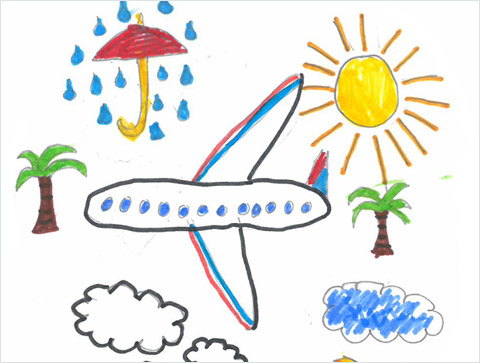Travel & Vaccinations
Being well prepared before you travel will ensure that you minimise the risk of preventable ill health whilst abroad. Exposure to these risks will depend on where you are travelling, how long you are travelling for and your living conditions. If you are going away and are unsure of what precautions you should be taking, or whether you require vaccinations, please call and book an appointment with one of our GPs who will be happy to provide you with all the necessary information.
Below you will find advice on how to deal with the most common problems you are likely to encounter, how best to prepare yourself for travel and how to ensure you return home in good health.
The advice is of necessity quite general and applies to healthy adults. Children’s needs can differ so please seek advice from one of our GPs.

Immunisation
Make sure you are up to date with all necessary immunisations. All of these can be done at The Harley Street General Practice, with the rare exception. Ideally, you should book in to see one of our GPs as soon as you know you are travelling to see what is needed and plan a timetable for vaccination. But most can be administered on the day.
Some vaccinations need several weeks to be fully active or a course of injections may be required. A good source of independent travel advice telling you likely vaccination requirement on the web is www.fitfortravel.scot.nhs.uk.
We are also a registered Yellow Fever Vaccination Centre and so are able to administer this vaccine and give a mandatory certificate which is required for entry into some countries.
Malaria Prevention
Malaria is widespread in tropical and sub-tropical areas of the world and is spread by the bite of an infected mosquito. Infection produces fever and, in some cases, complications affecting the kidneys, liver, brain and blood. Malaria can be fatal. Precautions should be taken if you are going to visit, travel through, or even just stop over in a malarial country.
Avoidance of mosquito bites is the single most important preventive measure, particularly with increasing resistance of the disease to drug treatment. This can be simply achieved by taking the following precautions:
- Use insect repellent, preferably one containing DEET (Diethyltoluamide)
- Keep your arms and legs covered with appropriate clothing (long trousers, sleeves and dresses) especially when out walking and around sunset and dawn when the infecting mosquitoes are most active
- Sleep in properly screened rooms and employ a “knockdown” spray to kill any mosquitoes in the room. Ideally use a mosquito net (which may be impregnated with insecticide) around the bed at night, ensuring that it has no holes and is well tucked in.
Malaria Prevention Tablets
Malaria Prevention tablets are vital in some areas where the above measures, although still essential, are unlikely to give adequate protection on their own. Our GPs will advise you if anti-malarial tablets are required for where you are travelling to (i.e.in high-risk areas) and if so, which ones are recommended. Some are prescription only.
Even if you have taken the most appropriate tablets none of these anti-malarial precautions can give absolute protection. So if you develop influenza-like symptoms, especially associated with shivering/shaking attacks (rigors) while abroad, or even within a year of returning from a malarial area or after discontinuing prophylaxis, you should seek medical attention urgently. You should tell the GP of your recent travel to a malarial area.
Jet Lag
Long haul flights of more than 5 hours time difference result in appreciable jet lag characterised by various symptoms including fatigue and inability to sleep at the new night time, headache, irritability, loss of concentration and gastrointestinal problems (indigestion, loss of appetite and bowel irregularities). The body will take longer to adjust if the flight is eastwards rather than westwards and adjustment is slowed by lack of sleep during the actual journey, the stress of travelling and alcohol. It is clear that work performances after arrival can be affected and since it may take 5 days to fully adjust, any measures that will help prevent jet lag are worthwhile.

You may also find it helpful to:
- Rest before departure.
- Drink plenty of water or soft drinks to counteract the dry cabin atmosphere thats leads to dehydration which is further increased by caffeine and alcohol.
- Stretch and exercise by walking frequently during the flight in order to aid circulation and prevent swollen ankles.
- Sleep on the plane, especially if you can sleep during the night time of your destination. If, necessary a mild sedative could be taken which should be discussed with the GP.
- Sleep at your normal night time, for flights of less than 72 hours, if at all possible. Taking brief (1-2 hour) naps is advised since longer periods of sleep will tend to move your body clock onto local time.
Sun Exposure
Exposure to sun leads not only to premature ageing of the skin, but also increases the risk of melanoma and other skin cancers. This risk is greater in those who are fair skinned or on certain medications such as diuretics or tetracycline antibiotics commonly used to treat acne. Sunscreen preparations containing agents protecting against the harmful effects of both UVA and UVB irradiation should be used at all times. Eye protection is advised by wearing sunglasses with UV light filters to reduce the long term risk of cataract formation.
Two common problems associated with excessive sun are detailed below with advice on how to deal with them.
Prickly heat
this is a common, intensely itchy rash that occurs in hot climates when the skin becomes red with small spots. The key to treatment is preventing sweating by reduced exertion, taking cool showers, dusting with talcum powder and wearing loose, cotton clothing. Calamine lotion and antihistamine tablets such as Clarityn or Zirtek, available over the counter at chemists, will help relieve the itching. If you are prone to this problem you are advised to commence treatment before arrival.
Sunburn
over exposure to the sun can cause redness, tenderness and blistering of the affected area of skin. Further exposure should be avoided until the symptoms have settled remembering that UV light can still cause damage by penetrating thin clothes, clouds, water and even shade. Cool showers, Calamine lotion and ‘after sun’ creams provide soothing relief. Avoid bursting blisters as this can lead to infection.
Safe Eating & Drinking
Wherever you are in the world you need to be careful what you eat and drink. Food and water can be contaminated in a variety of ways and this includes the water in swimming pools. Travellers’ diarrhoea, typhoid and hepatitis A can all be caught by eating contaminated food or water. Simple precautions to take include:

You may also find it helpful to:
- Eat freshly prepared food and ensure meat is cooked through.
- Be wary of salads, coleslaw, shellfish and particularly uncooked seafood such as oysters.
- Peel all fruit
- Avoid unpasteurised milk often used in local cheeses and ice creams.
- Always wash your hands after going to the lavatory, before handling food and before eating.
- If you have any doubts about the water available for drinking, washing food or cleaning teeth, boil it or sterilise it with disinfectant tablets or use sealed bottled water.
- Avoid ice unless you are certain it is made from safe water.
Travellers' Diarrhoea
This is a very common and troublesome complaint. If the diarrhoea is accompanied by persistent vomiting, a high fever or the passage of blood in the stools then prompt medical advice should be sought. Otherwise, ensure that you remain well hydrated by drinking plenty of fluids and avoiding any dairy products. Anti-diarrhoeals such as Imodium are useful to reduce the frequency of diarrhoea in the short term, but if symptoms persist beyond 3-4 days, again seek medical advice. Research has shown that most cases of travellers’ diarrhoea responds to two doses of Ciprofloxacin 500mg taken at an interval of 12 hours. Your GP may be prepared to prescribe this if your trip is 'high risk' and there are no contra-indications to you taking this medication.
Any diarrhoeal illness will result in significant loss of body fluids, partly from the diarrhoea itself and partly from the tendency to stop eating and drinking. It is vital to prevent dehydration by taking frequent small drinks of mineral water or by using oral rehydration salts such as Dioralyte.
Safe sex
The prevalence of many sexually transmitted infections is greater in many parts of the world when compared to the UK. You should regard casual sexual relationships as risky and take great care to avoid the potential for acquiring infection. Condoms are an absolute necessity and whilst substantially reducing the risk of sexually transmitted infection, they do not offer complete protection.
Deep Vein Thrombosis (DVT)
Many people are concerned about their personal risk of a DVT which is a clotting of the blood in a deep vein of the lower leg. If this occurs it usually causes pain, redness and swelling in the affected calf. Medical attention should be sought immediately, especially after a long air flight or other journey. Sometimes a DVT can be fatal if the clot breaks off and makes its way to the lungs where it can then affect the lungs’ ability to take in oxygen.
- Those in a higher risk category should see their GP before they travel and discuss prevention. This includes people with a personal or strong family history of thrombosis, smokers, those over the age of 65 and individuals who have undergone recent surgery (especially to lower limbs or abdomen). A history of cancer or heart disease may also be important. Also travellers who are obese, pregnant women and women taking oral contraceptives (particularly those who smoke) are at some increased risk.
- Some people in these "higher risk" categories mentioned above should discuss with their GP whether taking a small dose of aspirin before they fly (75mg) and wearing firm support stockings to reduce their risk is advisable.
- The personal entertainment available on many aeroplanes encourages us to stay rooted to our seats. However, try to exercise for 3 or 4 minutes every hour on long flights to ensure effective circulation of blood around the body.
- Too much alcohol, tea or coffee on flights causes dehydration which can also increase the risk of a DVT. Also, the air in a plane is very dry and the temperature warmer than we might normally have at home. It is very important to remain well hydrated during a long flight by drinking plenty of water or soft drinks.
Travelling During Pregnancy
You should always discuss any travel plans with your GP but you may find the following information helpful:
Flying
Flying itself is not harmful to your unborn child at any stage in pregnancy but please note that:
- You are at increased risk of deep vein thrombosis during pregnancy because of the enhanced ability of the blood to clot. Immobility and dehydration can increase this risk further so try to get up and walk down the aisle periodically and “circle” your ankles from time to time whilst sitting. Keep well hydrated with non-alcoholic drinks
- Immobility can also contribute to ankle swelling. Exercising your ankles and walking will reduce the chance of this developing. This can also be a sign of a serious medical condition and should be reported to a doctor if severe. Ankle swelling occurring in one leg only could be a sign of deep vein thrombosis
- There are limits imposed by most airlines on flying in late pregnancy. Please check whether a GP’s letter confirming that the pregnancy is uncomplicated is required, which we can provide.
Medical Care
- Make sure that you will not miss any key appointments in your antenatal care whilst you are away. Some pre-natal screening tests must be performed at a certain stage in pregnancy.
- See your GP or midwife for an antenatal check just before departure. Check with them when you should have your next appointment. Depending on the stage of pregnancy and the length of your visit, you may need to make arrangements for routine antenatal checks to be performed whilst you are away.
Malaria Prevention
The most important aspect of malarial prophylactics is mosquito bite precautions. This area is covered in some detail elsewhere in this information leaflet.
Vaccination During Pregnancy
Some vaccines can be given during pregnancy. The risk of contracting a serious illness must be weighed against the small, theoretical risk to the pregnancy of the vaccine. If you are planning to conceive, you should inform your GP prior to travel vaccinations.

